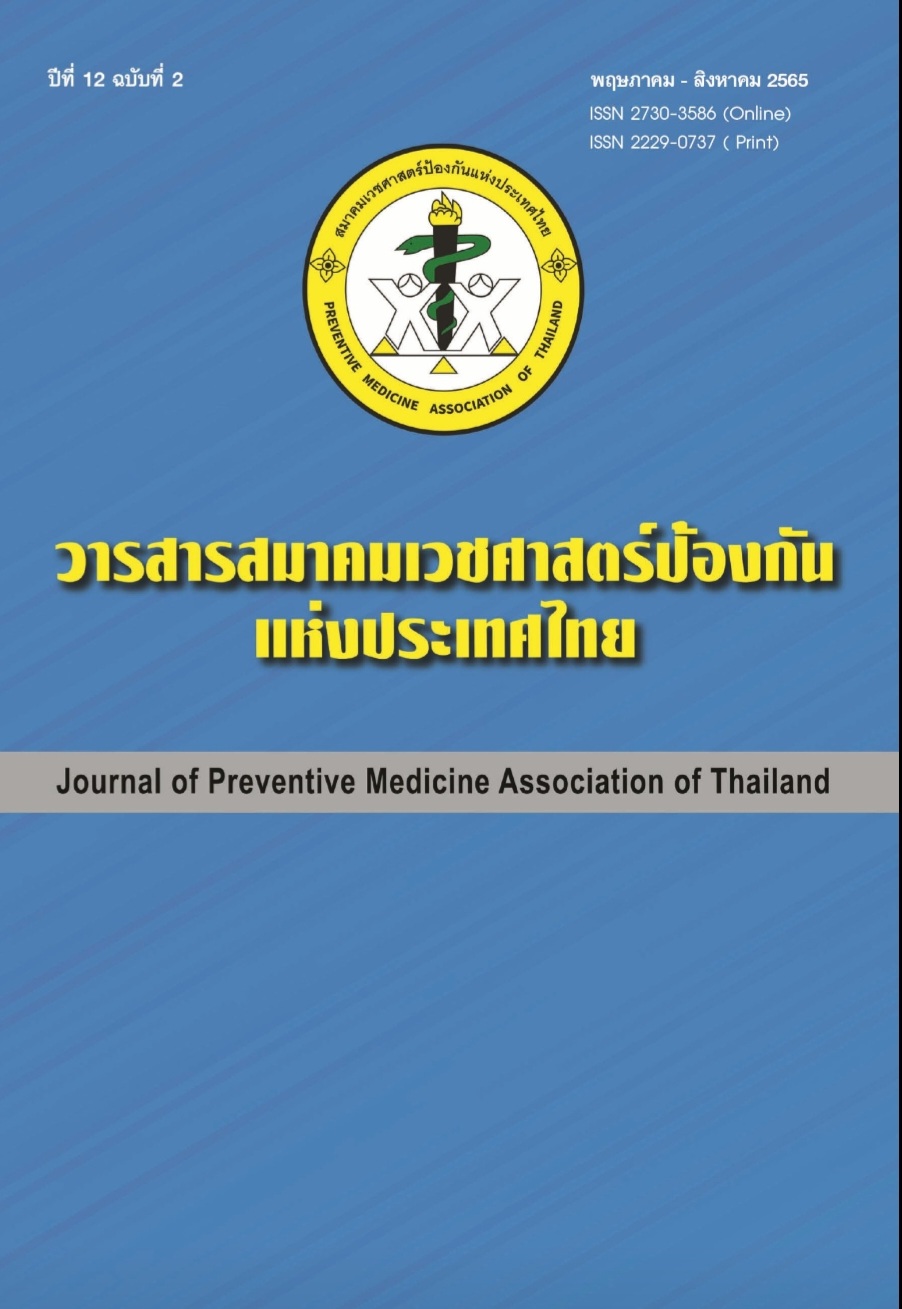A cross-sectional study of the knowledge about the impact of food practices on breast cancer and lifestyle in female breast cancer patients in a tertiary hospital, Bangkok, Thailand
Keywords:
breast cancer, diet, lifestyleAbstract
Background: Breast cancer is the most prevalent form of cancer among women in Thailand and worldwide. Although lifestyle is a significant risk factor for breast cancer, much of the attention in breast cancer prevention focuses on early detection and very little on lifestyle. This study was conducted to examine the knowledge and lifestyle of female breast cancer patients in a tertiary hospital.
Methods: A cross-sectional study was conducted at King Chulalongkorn Memorial Hospital (KCMH) between July to August, 2019. Using a questionnaire that had four parts, including the demographic data, clinical characteristics, medical history of family members, lifestyle practice of the patients and their knowledge score, were distributed to 250 adult female breast cancer patients in the outpatient department of KCMH.
Result: The mean knowledge score on the risk factors involving breast cancer was 11.14 out of 20, (standard deviation 3.38). Most participants had underlying diet-related diseases, which included hypertension (20.9%), dyslipidemia (18.1%), and diabetes (8.7%). The paticipants had family members with a medical history of diseases which included cancer (28.0%), diabetes (26.3%), hypertension (16.8%), and cardiovascular disease (9.1%).
Conclusion: The study revealed that the patients were not making the best choices to achieve a healthy lifestyle on preventing and managing breast cancer. Awareness, preventive measures, and lifestyle intervention need to be considered in dealing with this problem.
References
Society AC. Early History of Cancer [Internet]. [cited 2020 Jun 11]. Available from: https://www.cancer.org/cancer/cancer-basics/history-of-cancer/what-is-cancer.html.
National Cancer Institute. What is Cancer? [Internet]. [cited 2020 Jun 11]. Available from: https://www.cancer.gov/about-cancer/understanding/what-is-cancer.
Azamjah N, Soltan-Zadeh Y, Zayeri F. Global trend of breast cancer mortality rate: A 25-year study. Asian Pac J Cancer Prev 2019;20(7):2015-20.
World Health Organization (WHO). Cancer 12 September 2018 [Internet]. 2018 [cited 2020 Jun 11]. [Available from: https://www.who.int/news-room/fact-sheets/detail/cancer.
Bray F, Ferlay J, Soerjomataram I, Siegel RL, Torre LA, Jemal A. Global cancer statistics 2018: GLOBOCAN estimates of incidence and mortality worldwide for 36 cancers in 185 countries. CA Cancer J Clin 2018;68(6):394-424.
Weerawut Imsamran, Arkom Chaiwerawattana, Surapon Wiangnon, Donsuk Pongnikorn, Krittika Suwanrungruang, Suleeporn Sangrajrang, editors. Cancer in Thailand Vol. VIII, 2010-2012. Bangkok: Cancer Registry Unit, National Cancer Institute Thailand; 2015. p. 8.
Anand P, Kunnumakkara AB, Sundaram C, Harikumar KB, Tharakan ST, Lai OS, et al. Cancer is a preventable disease that requires major lifestyle changes. Pharm Res 2008;25(9):2097-116.
Sangrajrang S, Chaiwerawattana A, Ploysawang P, Nooklang K, Jamsri P, Somharnwong S. Obesity, diet and physical inactivity and risk of breast cancer in Thai women. Asian Pac J Cancer Prev 2013;14(11):7023-7.
Thompson R. Preventing cancer: the role of food, nutrition and physical activity. J Fam Health Care 2010;20(3):100-2.
Buranaruangrote S, Sindhu S, Mayer DK, Ratinthorn A, Khuhaprema T. Factors influencing the stages of breast cancer at the time of diagnosis in Thai women. Collegian 2014;21(1):11-20.
Siddharth R, Gupta D, Narang R, Singh P. Knowledge, attitude and practice about breast cancer and breast self-examination among women seeking out-patient care in a teaching hospital in central India. Indian J Cancer. 2016;53(2):226-9.
Peacey V, Steptoe A, Davidsdottir S, Baban A, Wardle J. Low levels of breast cancer risk awareness in young women: an international survey. Eur J Cancer 2006;42(15):2585-9.
Wakabayashi M, McKetin R, Banwell C, Yiengprugsawan V, Kelly M, Seubsman SA, et al. Alcohol consumption patterns in Thailand and their relationship with non-communicable disease. BMC Public Health 2015;15:1297.
Vidrine JI, Stewart DW, Stuyck SC, Ward JA, Brown AK, Smith C, et al. Lifestyle and cancer prevention in women: knowledge, perceptions, and compliance with recommended guidelines. J Womens Health (Larchmt) 2013;22(6):487-93.
Anothaisintawee T, Teerawattananon Y, Wiratkapun C, Srinakarin J, Woodtichartpreecha P, Hirunpat S, et al. Development and validation of a breast cancer risk prediction model for Thai women: a cross-sectional study. Asian Pac J Cancer Prev 2014;15(16):6811-7.
Ha SK. Dietary salt intake and hypertension. Electrolyte Blood Press 2014;12(1):7-18.
Park JH, Kim YC, Koo HS, Oh SW, Kim S, Chin HJ. Estimated amount of 24-hour urine sodium excretion is positively correlated with stomach and breast cancer prevalence in Korea. J Korean Med Sci 2014;29(Suppl2):S131-8.
Drenowatz C, Shook RP, Hand GA, Hebert JR, Blair SN. The independent association between diet quality and body composition. Sci Rep 2014;4:4928.
Romani M, Pistillo MP, Banelli B. Environmental epigenetics: crossroad between public health, lifestyle, and cancer prevention. Biomed Res Int 2015;2015:587983.
Mayor S. Healthy lifestyle may reduce breast cancer in women at high risk, study shows. BMJ 2016;353:i3047.
Cross AJ, Freedman ND, Ren J, Ward MH, Hollenbeck AR, Schatzkin A, et al. Meat consumption and risk of esophageal and gastric cancer in a large prospective study. Am J Gastroenterol 2011;106(3):432-42.
Downloads
Published
How to Cite
Issue
Section
License
Copyright (c) 2022 Journal of Preventive Medicine Association of Thailand

This work is licensed under a Creative Commons Attribution-NonCommercial-NoDerivatives 4.0 International License.
บทความที่ลงพิมพ์ในวารสารเวชศาสตร์ป้องกันแห่งประเทศไทย ถือเป็นผลงานวิชาการ งานวิจัย วิเคราะห์ วิจารณ์ เป็นความเห็นส่วนตัวของผู้นิพนธ์ กองบรรณาธิการไม่จำเป็นต้องเห็นด้วยเสมอไปและผู้นิพนธ์จะต้องรับผิดชอบต่อบทความของตนเอง






